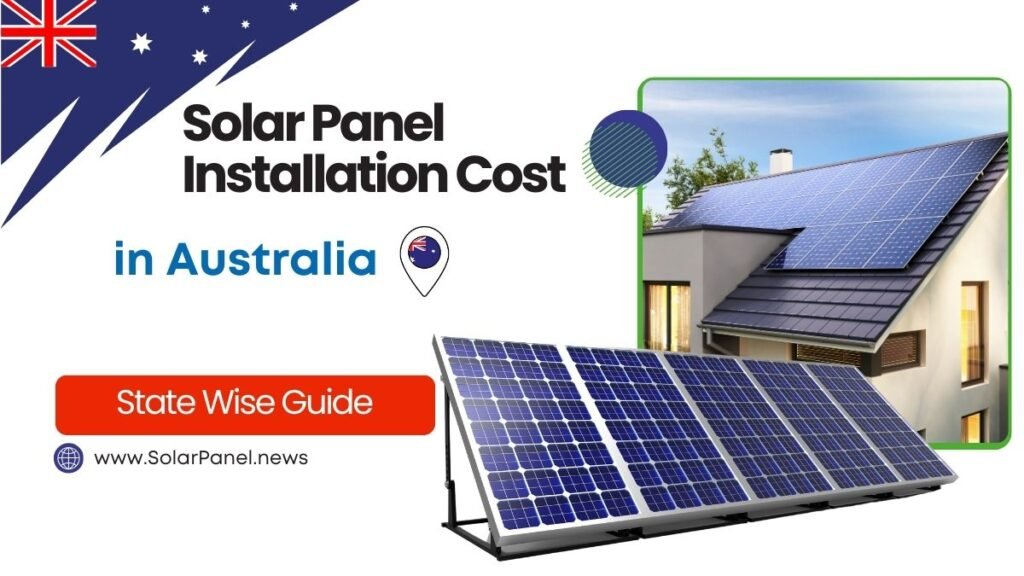Solar power adoption in Australia is surging, and this year is shaping up to be another record-breaking year. But how much does it actually cost to install a solar system where you live? Understanding the solar panel installation cost in Australia, especially on a state-by-state basis can help you make smarter and greener decisions.
Let’s find out what factors affect costs, current price averages, available discounts, and tips for getting the best deal.
Factors Driving Solar Panel Costs in Australia
Several variables influence the final price tag of a solar installation in Australia. These include:
- Small-scale Technology Certificates (STCs):
These federal incentives directly reduce upfront costs. The number of STCs you receive depends on your system size and location (i.e., solar zone). - Feed-in Tariffs (FiTs):
States and energy providers offer different rates for the excess solar power you export to the grid. Higher tariffs can improve ROI, but don’t directly impact installation cost. - Installer Availability & Labor Costs:
Areas with more competition among solar providers often enjoy lower prices. Labor is generally more expensive in urban regions like Sydney or Melbourne. - Sun Exposure & Climate:
Regions like Queensland and WA receive more sun, which can boost energy output and make solar a more lucrative investment, potentially influencing system sizing and cost.
Average Solar Panel Installation Cost in Australia by State
To give you a clearer picture, here’s a breakdown of average solar installation costs for 6kW and 10kW systems in major Australian states:

Here’s a detailed breakdown of the average solar panel installation cost in Australia based on system size and location.
| State | 6kW System Avg. Cost | 10kW System Avg. Cost |
| NSW | $5,800 – $7,200 | $8,900 – $11,500 |
| VIC | $5,500 – $7,000 | $8,500 – $11,000 |
| QLD | $5,400 – $6,800 | $8,300 – $10,800 |
| WA | $5,900 – $7,500 | $9,200 – $12,000 |
💡 Note: These prices reflect average estimates after STC deductions but before any state rebates or battery incentives.
Why the Price Differences?
- NSW and VIC: Higher competition among installers keeps prices relatively low.
- QLD: Abundant sunshine allows for more efficient systems, slightly reducing overall costs.
- WA: Higher labor and transport costs due to regional spread.
Federal & State Incentives to set up solar panels
The Australian government continues to support renewable energy through various incentives , which directly impact the solar panel installation cost Australia .
🏛️ National-Level Support:
- Small-scale Renewable Energy Scheme (SRES): Provides STCs based on system size and location.
- Battery Rebate Programs: (Some states offer additional subsidies when pairing solar with battery storage). That means, particularly strong in South Australia and Queensland (QLD). These can cover 20-40% of battery installation costs, depending on income and eligibility.
📈 State-Specific Rebates:
- NSW: Empowering Homes Program offers up to $9,000 off solar + battery combo.
- VIC: Solar Homes Program provides rebates up to $1,400.
- QLD: Interest-free loans for solar and batteries via the QLD Government.
- WA: Limited-time feed-in tariffs and local council grants.
Always check your state’s official energy website or contact your local council to see what programs apply to your area.
How Aussies Can Save on Solar Installations
Want to minimize your solar panel installation cost in Australia? Here are proven ways to save money without compromising quality.
✅ Smart Tips to Reduce Costs:
- Go Big, Go Bulk: Larger systems (like 10kW) often have a lower cost per watt.
- Use CEC-Accredited Installers: They follow best practices and ensure eligibility for rebates.
- Compare Quotes: Use platforms like SolarQuotes to get multiple quotes quickly.
- Time Your Purchase: End-of-quarter deals or seasonal promotions can yield significant savings.
- Negotiate Extras: Ask for free monitoring software or extended warranties.
By doing your homework, you can shave hundreds, even thousands, off your final bill.
Best Solar Cost Estimator Tools in Australia
Unsure what solar might cost you personally? Use these reliable online tools:
- SolarQuotes Solar Calculator
One of Australia’s most detailed estimators with postcode-based analysis. - Energy Made Easy by the AER
Great for comparing retail offers and solar feed-in tariffs by provider. - CEC’s Solar System Size Estimator
Offers system sizing and cost estimates based on your usage and roof area.
Solar Affordability and Payoff Timeline
Is solar still worth it? Absolutely! Especially considering rising electricity prices.
- Average Payback Period (6kW System):
~3.5 to 5 years, depending on state and energy usage. - Expected Lifetime Savings:
Over $25,000-$40,000 for most residential systems over 20 years.
After the payback period, your electricity bills drop dramatically, sometimes to near zero.
ROI Considerations:
- Rising electricity rates mean faster returns.
- Solar systems typically last 25+ years, giving you decades of clean, cheap energy.
- Adding a battery increases initial cost but boosts long-term savings.
As Australia moves toward its net-zero goals, solar adoption becomes not only affordable but essential.
Note: In sunny states like QLD and WA, the ROI can be even faster thanks to higher sun hours and lower upfront costs.
✅ Pros & Cons of Installing Solar in Australia
| Pros | Cons |
| Significant reduction in electricity bills | Upfront investment required |
| Environmentally friendly energy source | Weather-dependent performance |
| Long-term return on investment | Battery upgrades add cost |
| Increased home value | Requires roof space and structural integrity |
| Access to federal and state rebates | Complexity in choosing the right system |
Mini FAQ: People Also Ask
Q: Is it worth installing solar with a battery?
A: If you want energy independence or face high peak tariffs, a battery can significantly increase your savings, especially with subsidies.
Are you an American citizen? Then read: Solar Panel Installation Cost in the USA.
Conclusion,
If you’re considering going solar, there’s never been a better time. With competitive solar panel installation costs across Australia and strong federal and state incentives still available, the opportunity to slash your electricity bills and embrace clean energy is now.

